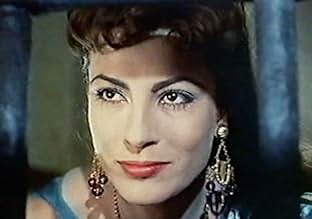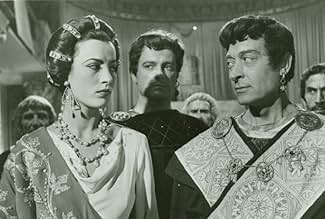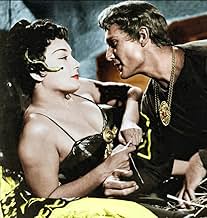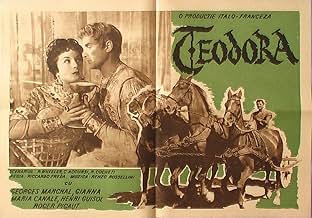Aggiungi una trama nella tua linguaTeodora, a Roman courtesan and former slave girl, marries the Roman emperor Justinian and assumes the throne as Empress of Rome. But the divide between nobility and slave is too great. Teodo... Leggi tuttoTeodora, a Roman courtesan and former slave girl, marries the Roman emperor Justinian and assumes the throne as Empress of Rome. But the divide between nobility and slave is too great. Teodora seeks justice for her people, and revolution and armed conflict erupt in both Byzantium... Leggi tuttoTeodora, a Roman courtesan and former slave girl, marries the Roman emperor Justinian and assumes the throne as Empress of Rome. But the divide between nobility and slave is too great. Teodora seeks justice for her people, and revolution and armed conflict erupt in both Byzantium and Rome.
- Regia
- Sceneggiatura
- Star
- Scarpios
- (as Carletto Sposíto)
- Il mercante di sandali
- (non citato nei titoli originali)
- Una guardia
- (non citato nei titoli originali)
- Bit part
- (non citato nei titoli originali)
Recensioni in evidenza
Very well done Chariot Race scene especially in view of the fact that it was done five years before William Wylers "Ben Hur". I'm not sure about the aspect ratio of the film. The IMDb says it is 1.33:1.
The director isn't afraid to take the camera outdoors and the sets are pretty good too.
In the case of Theodora it is difficult to separate truth from legend but what is certain is that she was an extremely strong-willed, determined woman and a capable ruler who is alas portrayed very superficially here. In fact these are all one-dimensional characters and not flesh and blood. The notable exception is the striking and charismatic Irene Papas. She is still serving her time here and is probably best known to cinema goers as the widow in 'Zorba the Greek'. Her portrayal of Theodora's sister is a foretaste of her later depictions of Antigone, Electra and Helen of Troy in which she proved her extraordinary range. The settings are excellent, the Pathe colour glorious and we are treated to a spectacular chariot race. Sadly this is not quite enough. The films poster declares "Never was such passion!" Passion however is the one thing it lacks and although both Canale and Marchal look lovely they are just not compelling enough.
Perhaps I am expecting too much but Blasetti's 'Fabiola' and Gallone's 'Messalina' prove that even in a 'Peplum', strong characterisation is achievable.
Theodora is an impressive looking historical Italian epic with its beautiful pathe colour, superb sets, costumes, but the acting and drama is as impressive - Gianna Maria Canale is superb in the title role, who becomes an empress from a courtesan and helps her husband -the emperor- bridge the gap between his people and hers. But, of course, there's always villains who don't like what she's doing so they plan to wreck her plans by sowing the seeds of misunderstandings.
George Marchal is great as the emperor, and the romance between him and Theodora comes out naturally and gradually. There's plenty of drama and court intrigue so don't expect much action, though that comes at the end and there's a rousing chariot race. The finale is quite a nail biter, too.
After the black-and-white and merely standard SINS OF ROME (1953), Freda turned to color for his subsequent spectacle which, apart from drawing on Alessandro Blasetti's virtual genre template FABIOLA (1948), was inspired by the likes of Sergei Eisenstein's IVAN THE TERRIBLE (1942-6) for its look – and the result is a truly opulent production. On the other hand, the chariot-race set-piece (in which both stars meet the challenge head-on!) is a veritable dry-run – albeit reprehensibly featuring some of the worst horse-falls I have ever seen! – for the celebrated one in William Wyler's BEN-HUR (1959). The way in which the protagonists 'meet cute' is also memorable: Marchal is the Emperor Justinian who, while mingling incognito with the crowds in a market place, is nearly robbed of a medallion by commoner/dancer/lion-tamer Canale! Of course, the two fall in love and marry but her surprising subsequent influence at court (incidentally, though the print I watched – derived from a late-night Italian TV screening – simply bore the heroine's name, the film is better-known by its full title which translates to THEODORA, EMPRESS OF BYZANTIUM!) is inconvenient to those patricians who seek to overthrow the Emperor! By the way, the plot unfolds in flashback (narrated by the now-aged hero), so that we are left wondering about Canale's fate – for the record, even her own sister (played by a young Irene Papas) bears her ill-will – until the very last moments of the film!
Unfortunately, the Emperor proves to be rather gullible and his wife's relationship with a former beau (which she keeps up as a means of co-ordinating a full-bodied resistance) is misconstrued as an adulterous affair – resulting in Marchal's frequent outbursts of name-calling! This turn-of-events lends an unexpected amour fou connotation to the proceedings which, while bordering on the contrived, culminates in a remarkable sequence in which Canale is surrounded by Marchal's loyal troops ready for the kill before a horde of steeds, and eventually, lions is unleashed upon the soldiers! By this time, however, Marchal has been alerted to the truth vis-a'-vis who his real allies are, with the intended usurper at long last spewing his bile against the Emperor – amusingly begrudging the latter's handsome athleticism having been favored by the Gods over his own, as Wile E. Coyote would so unforgettably put it, "pure unadulterated genius"!
Lo sapevi?
- QuizThe gigantic settings were built in Rome on grounds intended for an international fair to take place in 1943, but never occurred because of the war.
- ConnessioniReferenced in Bloodthirst (2022)
I più visti
- How long is Theodora, Slave Empress?Powered by Alexa
Dettagli
- Data di uscita
- Paesi di origine
- Lingua
- Celebre anche come
- Theodora, Slave Empress
- Luoghi delle riprese
- S.A.F.A. Studios, Roma, Lazio, Italia(Studio, Stabilimenti S.A.F.A. Palatino, Rome)
- Aziende produttrici
- Vedi altri crediti dell’azienda su IMDbPro
- Tempo di esecuzione2 ore 4 minuti
- Proporzioni
- 1.37 : 1
Contribuisci a questa pagina




























